Text
Characters: Building, Breaking and Rebuilding
Characters are the inhabitants of the worlds you create. They drive your stories and pull in fans. They are how you provide representation and channel conflict. The problem is, these super important members of your paper population don’t like to behave.
Sometimes you need to break them down and start again
Look at where they started, their original inspiration or, if that’s too vague, their core characteristics. Remove everything else that contributes to their personality, such as backstory and desires. Just examine the set of basics that made their skeleton and ask yourself some questions. Some possibilities are:
What other desires might they have? How do these basic traits impact their relationships with others? What flaws might these traits and characteristics lead to? Why are they like this? Can they grow? If not, try tweaking their basics. What are their fundamental morals? Their personal code? Are there any tropes that they fall into? Do you like this trope? What could these basics do for creating conflict? How much pressure can they take before breaking?
After that, you can start to remould them based around those new answers. There is a set of important things that you should always consider when making characters, whether they are new ones or old ones being redone.
Desires
Without desires, your characters are listless and uninteresting. There is one exception, which I will cover later on, but for the most part characters must must must have at least one desire to drive them. It could be something really simple or honest, like a steady job or a roof over their head. If you’re creative, even the most basic of desires can drive an enthralling plot.
What does your character want, more than anything? What would they do to get that thing? How do their morals and personal code influence the lengths they will go to in order to fullfill their desires? Are their desires typically good things, or bad things? How does this drive them? Do their desires define them as a person, or are they just side wants that come to the forefront because of the plot?
Flaws
I made a post on flaws, traits and disabilities (link at the end), where I talked about the ways these things are linked but are not one and the same, and covered the different types of flaws. Some considerations:
How do these flaws govern their actions? Their relationships? What kind of flaw is it? Negative or positive? How could these flaws drive conflict?
Growth
Characters need to grow to keep interest. I still maintain that Jane Eyre is such a lovable character because we see her grow from a child who has strong ideas but is ill-equipped to convey them and so becomes difficult, into a woman who knows how to stand her ground and uphold her morals while learning along the way to forgive and understand. She’s only one example of literal thousands, but you would do well to keep this in mind. Growth doesn’t mean a total revolution of character, it just means learning and expanding from the original stem.
What could motivate them to grow? Why would they need to? Who helps them along the way? Would they understand their need to grow themselves, or would someone have to push them to it?
Bending and breaking
My favourite ever piece of advice is that your characters are like geodes and must be broken before they can be displayed in their full colours. I’ve forgotten where I heard it/read it, and the actual words, but the gist of the quote has stayed with me for years. It is so true! Find every weak point and jab your pointy pencil in there, hard.
What are their worst fears? Would could they do that would cause them huge emotional distress? Would could push them to do said emotional distress-causing thing? What are their limits? Who or what could be a point of weakness for them?
Making mistakes
Put simply, let your characters fuck up. They’re your characters, yeah, but they’re just characters. There is no need for them to be perfect, smart, witty players in your plot. Readers want to see themselves, at least in part, in the books they choose, and readers are only human.
What could your character do that would be irreversable? Would they care enough to try and reverse it? How would other characters react?
Real life
Following the same philsophy as above, let real life happen to your characters, even if they’re in space running through a hostile planet or a fantasy world of your own creation.
Do they have a family, children? Could they fall in love and mess up? Are there people being left behind for the sake of this character’s goals? Is there a family member or close friend who could die of completely mundane causes? If the situation around your character is anything but mundane, this would be all the more heart breaking. Are there any small, personal life things that they have forgotten about in the course of the plot?
Real life lends itself to sub-plots, which are really important for driving the story as a whole.
Loopholes
How do your characters fail to fit this criteria? What can you do with this? Can it be turned to your advantage? Be creative!
For example: the one exception to having desires could be the flaw of a character being exceptionally apathetic to the point of making thing s worse for other characters, or having to force themselves not to have any desires to survive (see: The Handmaid’s Tale by Margret Atwood, in which Offred is a passive protagonist to make a point about the society of Gilead). In the case of the flaw of extreme apathy, play with what could potentionally change this. Or, as in the book Apathy and Other Small Victories, have a plot that revolves around the protagonist doing nothing and play with the chaos and hilarity that ensues.
Finally, consider the world they live in. Study their backstory, what they came from and where they are going, and put all of these together.
Some other posts on characters to help you out:
Ways to create and develop characters
Rules for character building (including where they came from and where they’re going, and how this helps their growth)
Distinctions between flaws, disabilities and traits- plus the different kinds of flaws and the considerations you could make
This has been part of my weekly set of advice articles. Each week I make an article or series of articles on the things you have asked for help with, or things that I feel need to be covered, such as aspects of representation. Check the tag, #artie gives advice.
If you need any help on anything else in the meantime, general or specific, drop an ask!
Best of luck ʕ •́؈•̀ ₎
1K notes
·
View notes
Text

More often than not I’ll crack into a sprawling fantasy series and, while I appreciate the luscious descriptions of furniture, landscapes, and clothing, all I’m focused on is that I don’t actually know how this world works. I only know what it looks like.
Including some functionality to your universe can add to immersion and give your reader a strong foundation on which to build their mental model of your universe.
You certainly don’t need to use all of these questions! In fact, I recommend against that, as all of these certainly won’t make it into your final draft. I personally find that starting my worldbuilding off with 5 to 10 functional questions helps pave the way for glittery and elaborate aesthetic development later on.

How is the healthcare funded in your world?
How does healthcare functionally differ between the wealthy and the poor? (i.e. can only the wealthy go to hospitals? do poor families often have to rely on back-alley procedures?)
Where are health centers (i.e. hospitals, small clinics, etc.) organized in your cities?
Does it differ in smaller towns?
How does this affect people’s ability to get healthcare?
Is healthcare magical, and if it is, how does that affect the healthcare system?
If healing is instantaneous, how does that affect people’s views on injury, illness, and chronic ailments?
If you have both magical and physical healthcare, which one is deemed superior and how does that affect society?
What illnesses are common in your world?
How does this affect daily life?
What do the people in your world think illnesses are?
Is it a miasma theory?
Humor theory?
Demons?
Do they know about biological viruses and bacteria?
How does this affect healthcare?

How do people get water?
Is the water sanitary and if not, how do they sanitize it?
How does agriculture work?
Is it large corporations or individual farms?
What sort of agricultural technology exists in your world and how does it affect food production?
Are farmers wealthy or poor?
What sort of natural resources does your world/country(ies) have and how are they obtained?
How does this affect the average wealth of the country?
How does this wealth affect the culture?
What livestock or beasts of burden are most valued? Least valued? Why?
What is considered a luxury good vs. a regular good?

What forms of transportation does your world have?
What classes use what forms of transportation?
How far has the average citizen traveled, given your transportation limitations?
Which cities are the most accessible and which are the least? Why?
How do popular transportation methods change how cities/towns are laid out?
Does your world have public transportation? What is it?
Is there a coming-of-age aspect to travel?
Describe your world’s postal system or whatever equivalent there is.
Who pays for it?
How reliable is it?
Are there emergency methods for transporting information?

How does your world keep time (i.e. watches, sundials, water clock, etc.)?
Does your world have a currency system, barter system, or something else?
If you have multiple countries, do different currencies have different values across said countries?
How does this affect travel?
Do you have banks in your world and if so, how are they run?
Who owns the banks? Government? Wealthy? How does this affect the economy and/or class system?
How does credit operate in your universe?
Does your world operate more on big corporations or small business? Something in between?
How are workers/labourers treated in your world?
Are there workers unions and if so, what are common views on unions?
Describe your tax system. If you don’t have a tax system, explain why and how your world is affected by that.
Can certain social classes not own property, certain livestock, certain businesses, etc.? Why?
How are business records kept? Are business records kept?
If your world has technology, does your world prioritize developing entertainment tech, communications tech, transportation tech or something else entirely?
What does this say about your world?
How does this affect your economy?

To the closest approximation, what type of government does your world have?
How are rulers/presidents/nobles put in place?
How much power does an individual ruler have?
Is there a veto process?
If you have multiple countries, do they have different types of rulers?
Describe any large-scale alliances (i.e. countries, factions, etc.) that are present in your world.
How did they come about and how are they maintained?
Are they strained or peaceful?
How does it affect the greater politics of your world?
Describe how wars are fought both internationally and nationally.
Do methods of war differ between countries/races?
What about philosophies about war?
If there is a military, what is its hierarchy structure?
How does the military recruit?
Is the military looked upon favourably in your society?
What weapons are used by each country/type of people during warfare, and how does that affect war strategies?
Describe the sentencing system of your world.
Is your accused innocent until proven guilty, or guilty until proven innocent?
How are lawbreakers punished?
If you have prisons, describe how they are organized and run, and who owns them.
Does differing ownership change how the prisons operate?
What are the major ways in which laws between countries vary?
Do laws between cities vary? If so, how and why?
How does citizenship work in your world? What rights and privileges do citizens have that others do not?
Can certain classes or races not become citizens?
Are there certain taboo subjects or opinions that artist/authors/musicians are not allowed to depict (i.e. portraying the official religion in a negative light, explicit sexual material, etc.)? What does this say about your society?
How do people get around these censorship laws?
What is the official hierarchy of duty in your world? (i.e. is family the most important, or patriotism? What about clan?)
How many languages are there in your world, and how many languages share a common origin?
How many people are multilingual?
Which language is the most common?
How is multilingualism viewed?
How are different languages viewed? (i.e. is one language ugly/barbaric while another is romantic and sensual?)
Feel free to add your own questions in reblogs or in comments!
62K notes
·
View notes
Text
Fantasy Fashion: Regency
The Regency was a period of English history when the young Prince George ruled on his father’s behalf. This was a time for change in the world. And fashion. This is the time of Jane Austen.
The Empire Gown.
These gowns were gathered at the waist or under the boobs. The skirt was light and flowing. Everything echoes gowns of greek goddesses. These were usually made from muslin or lawn.

Pantaloons
The underwear of the gown. Most times They were flesh coloured to not show through the gown of the lady.
Gloves
Regency ladies lived their gloves. Long white silk ones or short ones. Gloves were in place to cover the necessary parts of the skin. If your dress was short sleeved, you have a long pair of gloves.
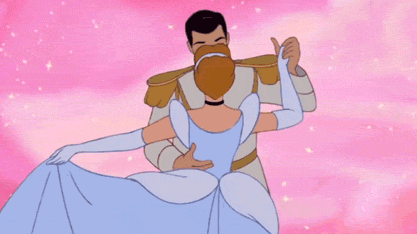
Bonnets
Usually woven from straw. Ladies could adorn them in whatever fashion they liked. Worn outside mostly.
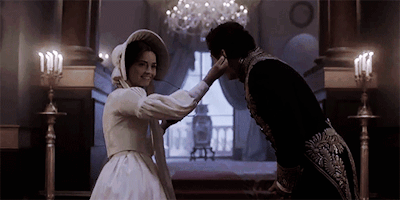
Shawls
Became fashionable during the Regency. These shawls were light material and worn if outside or chilled.
For @ocean-in-my-rebel-soul
276 notes
·
View notes
Text
Unreliable narrators need to add something to the story. They aren’t an excuse for poor storytelling and inconsistencies.
44K notes
·
View notes
Text
5 Moral Dilemmas That Make Characters and Stories Even Better
Readers can’t resist turning pages when characters are facing tough choices. Use these 5 keys to weave moral dilemmas into your stories–and watch your fiction climb to new heights.
#1: Give Your Character Dueling Desires
Before our characters can face difficult moral decisions, we need to give them beliefs that matter: The assassin has his own moral code not to harm women or children, the missionary would rather die than renounce his faith, the father would sacrifice everything to pay the ransom to save his daughter.
A character without an attitude, without a spine, without convictions, is one who will be hard for readers to cheer for and easy for them to forget.
So, to create an intriguing character facing meaningful and difficult choices, give her two equally strong convictions that can be placed in opposition to each other.
For example: A woman wants (1) peace in her home and (2) openness between her and her husband. So, when she begins to suspect that he’s cheating on her, she’ll struggle with trying to decide whether or not to confront him about it. If she only wanted peace she could ignore the problem; if she only wanted openness she would bring it up regardless of the results. But her dueling desires won’t allow her such a simple solution.
That creates tension.
And tension drives a story forward.
So, find two things that your character is dedicated to and then make him choose between them. Look for ways to use his two desires to force him into doing something he doesn’t want to do.
For instance, a Mennonite pastor’s daughter is killed by a drunk driver. When the man is released on a technicality, does the minister forgive him (and what would that even look like?) or does he take justice into his own hands? In this case, his (1) pacifist beliefs are in conflict with his (2) desire for justice. What does he do?
Good question.
Good tension.
Good drama.
Another example: Your protagonist believes (1) that cultures should be allowed to define their own subjective moralities, but also (2) that women should be treated with the same dignity and respect as men. She can’t stand the thought of women being oppressed by the cultures of certain countries, but she also feels it’s wrong to impose her values on someone else. When she is transplanted to one of those countries, then, what does she do?
Construct situations in which your character’s equally strong convictions are in opposition to each other, and you will create occasions for thorny moral choices.
#2: Put Your Character’s Convictions to the Test
We don’t usually think of it this way, but in a very real sense, to bribe someone is to pay him to go against his beliefs; to extort someone is to threaten him unless he goes against them.
For example:
How much would you have to pay the vegan animal rights activist to eat a steak (bribery)? Or, how would you need to threaten her in order to coerce her into doing it (extortion)?
What would it cost to get the loving, dedicated couple to agree never to see each other again (bribery)? Or, how would you need to threaten them to get them to do so (extortion)?
What would you need to pay the pregnant teenage Catholic girl to convince her to have an abortion (bribery)? What threat could you use to get her to do it (extortion)?
Look for ways to bribe and extort your characters. Don’t be easy on them. As writers we sometimes care about our characters so much that we don’t want them to suffer. As a result we might shy away from putting them into difficult situations.
Guess what?
That’s the exact opposite of what needs to happen in order for our fiction to be compelling.
What’s the worst thing you can think of happening to your character, contextually, within this story? Now, challenge yourself—try to think of something else just
as bad, and force your character to decide between
the two.
Plumb the depths of your character’s convictions by asking, “How far will s/he go to … ?” and “What would it take for … ?”
(1) How far will Frank go to protect the one he loves?
(2) What would it take for him to stand by and watch the one he loves die when he has the power to save her?
(1) How far will Angie go to find freedom?
(2) What would it take for her to choose to be buried alive?
(1) How far will Detective Rodriguez go to pursue justice?
(2) What would it take for him to commit perjury and send an innocent person to death row?
Ask yourself: What does my character believe in? What priorities does she have? What prejudices does she need to overcome? Then, put her convictions to the ultimate test to make her truest desires and priorities come to the surface.
#3: Force Your Character into a Corner
Don’t give him an easy out. Don’t give him any wiggle room. Force him to make a choice, to act. He cannot abstain. Take him through the process of dilemma, choice, action and consequence:
(1) Something that matters must be at stake.
(2) There’s no easy solution, no easy way out.
(3) Your character must make a choice. He must act.
(4) That choice deepens the tension and propels the story forward.
(5) The character must live with the consequences of his decisions and actions.
If there’s an easy solution there’s no true moral dilemma. Don’t make one of the choices “the lesser of two evils”; after all, if one is lesser, it makes the decision easier.
For example, say you’ve taken the suggestion in the first key above and forced your character to choose between honoring equal obligations. He could be caught between loyalty to two parties, or perhaps be torn between his family obligations and his job responsibilities. Now, raise the stakes—his marriage is at risk and so is his job, but he can’t save them both. What does he do?
The more imminent you make the choice and the higher the stakes that decision carries, the sharper the dramatic tension and the greater your readers’ emotional engagement. To achieve this, ask “What if?” and the questions that naturally follow:
What if she knows that being with the man she loves will cause him to lose his career? How much of her lover’s happiness would she be willing to sacrifice to be with him?
What if an attorney finds herself defending someone she knows is guilty? What does she do? What if that person is her best friend?
What if your character has to choose between killing himself or being forced to watch a friend die?
Again, make your character reevaluate his beliefs, question his assumptions and justify his choices. Ask yourself: How is he going to get out of this? What will he have to give up (something precious) or take upon himself (something painful) in the process?
Explore those slippery slopes. Delve into those gray areas. Avoid questions that elicit a yes or no answer, such as: “Is killing the innocent ever justified?” Instead, frame the question in a way that forces you to take things deeper: “When is killing the innocent justified?” Rather than, “Does the end justify the means?” ask, “When does the end justify the means?”
#4: Let the Dilemmas Grow From the Genre
Examine your genre and allow it to influence the choices your character must face. For instance, crime stories naturally lend themselves to exploring issues of justice and injustice: At what point do revenge and justice converge? What does that require of this character? When is preemptive justice really injustice?
Love, romance and relationship stories often deal with themes of faithfulness and betrayal: When is it better to hide the truth than to share it? How far can you shade the truth before it becomes a lie? When do you tell someone a secret that would hurt him? For example, your protagonist, a young bride-to-be, has a one-night stand. She feels terrible because she loves her fiancé, but should she tell him what happened and shatter him—and perhaps lose him—or keep the truth hidden?
Fantasy, myth and science fiction are good venues for exploring issues of consciousness, humanity and morality: How self-aware does something need to be (an animal, a computer, an unborn baby) before it should be afforded the same rights as fully developed humans? At what point does destroying an AI computer become murder? Do we really have free will or are our choices determined by our genetic makeup and environmental cues?
#5: Look the Third Way
You want your readers to be thinking, I have no idea how this is going to play out. And then, when they see where things go, you want them to be satisfied.
There’s a story in the Bible about a time religious leaders caught a woman committing adultery and brought her to Jesus. In those days, in that culture, adultery was an offense that was punishable by death. The men asked Jesus what they should do with this woman. Now, if Jesus had told them to simply let her go free he would have been contravening the law; if, however, he told them to put her to death, he would have undermined his message of “forgiveness and mercy.”
It seemed like a pretty good trap, until he said, “Whoever is without sin among you, let him cast the first stone.”
Nicely done.
I call this finding the Third Way. It’s a solution that’s consistent with the character’s attitude, beliefs and priorities, while also being logical and surprising.
We want the solutions that our heroes come up with to be unexpected and inevitable.
Present yours with a seemingly impossible conundrum.
And then help him find the Third Way out.
I hope this helped! I’ve been really busy today, seeing how my mom had surgery and I’ve been trying to continue writing my novel today as well. I thought I’d squeeze in some more stuff for you guys!
If you have any questions or just want to talk, feel free to visit my ask box!
62K notes
·
View notes
Photo
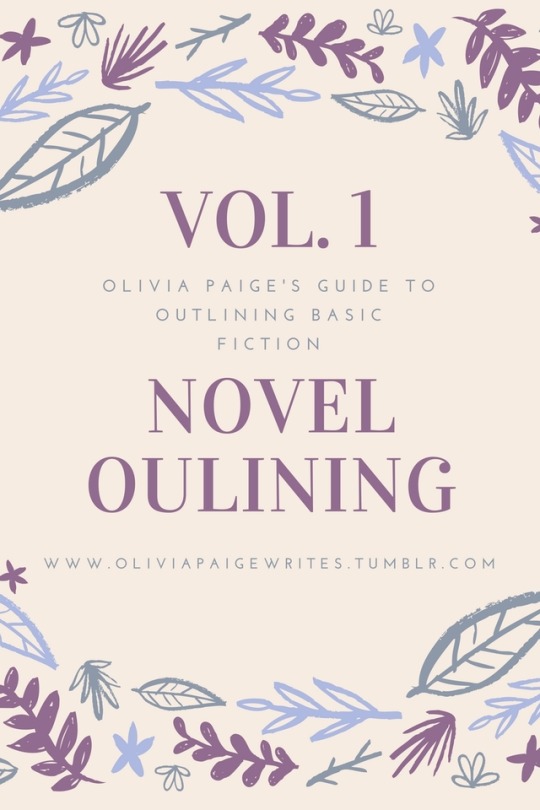
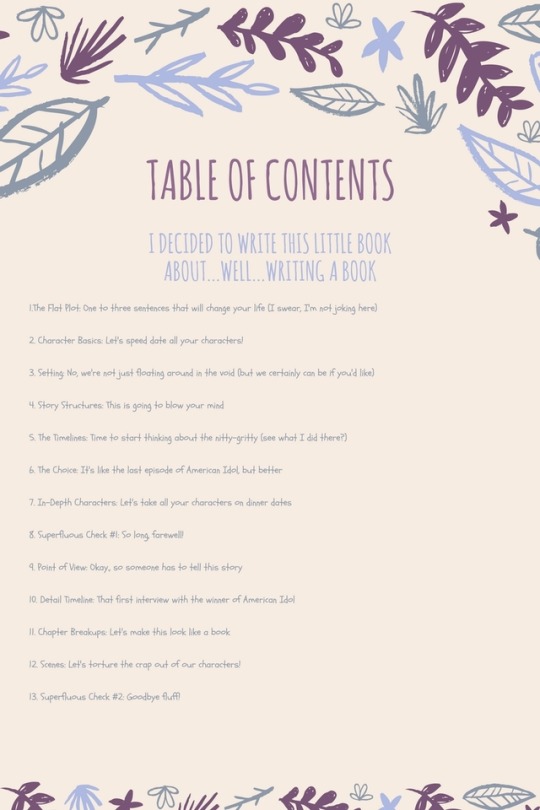
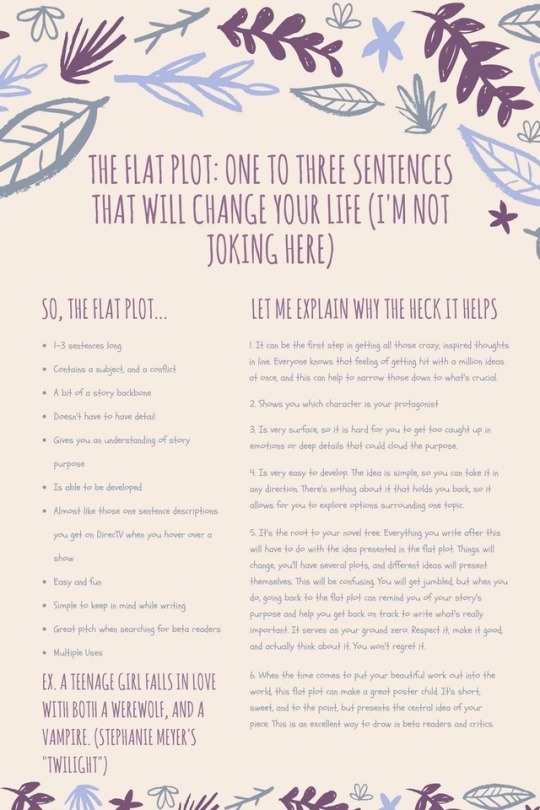
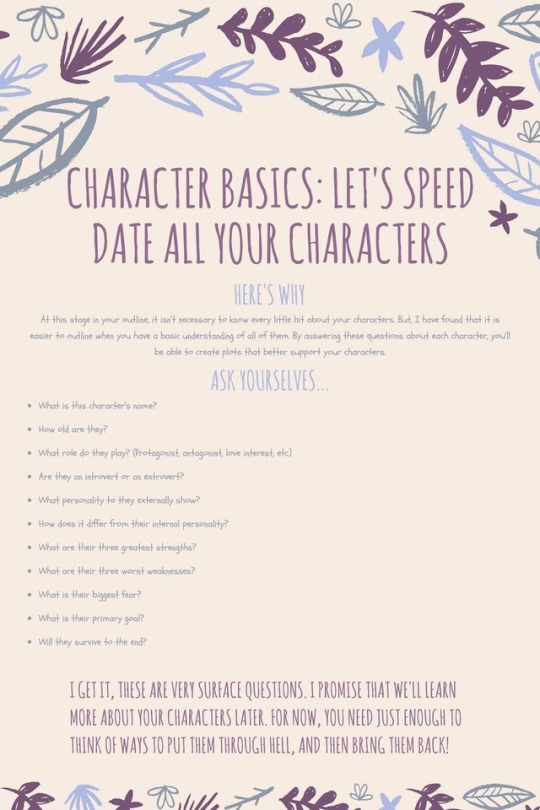
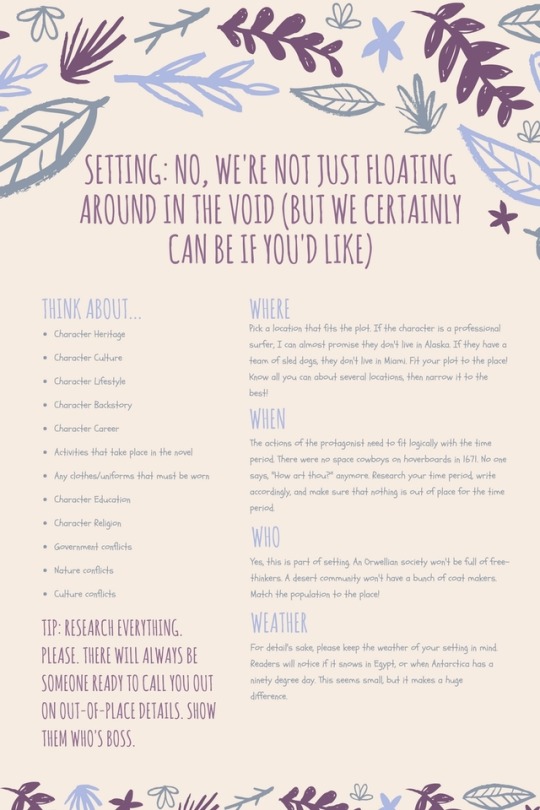
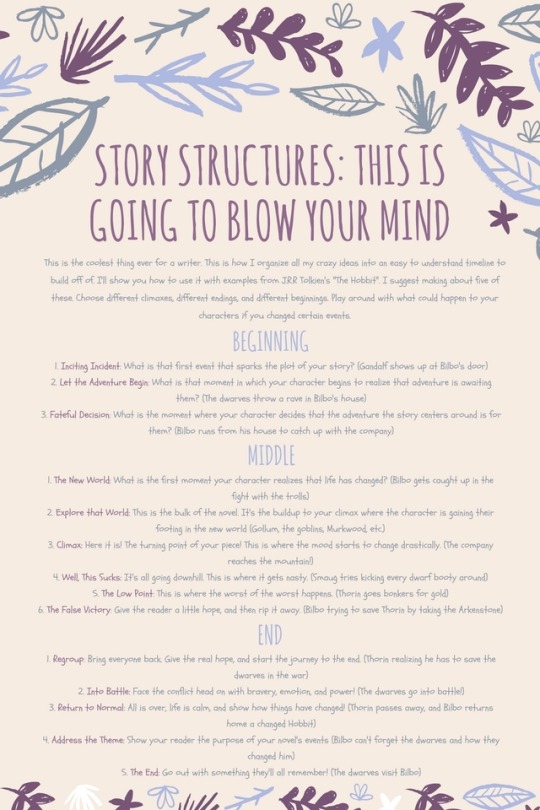
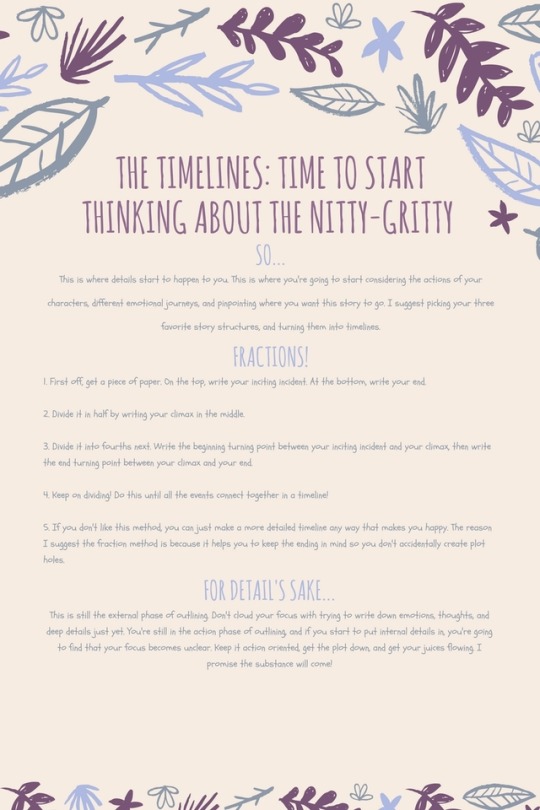
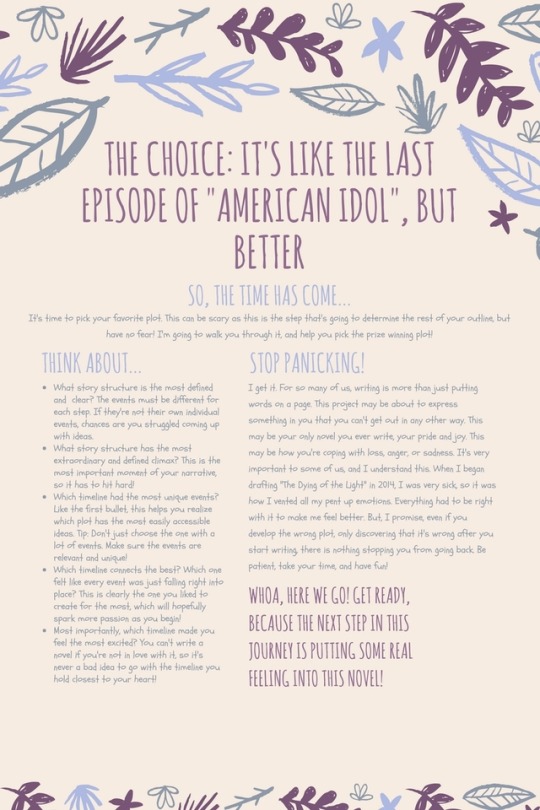
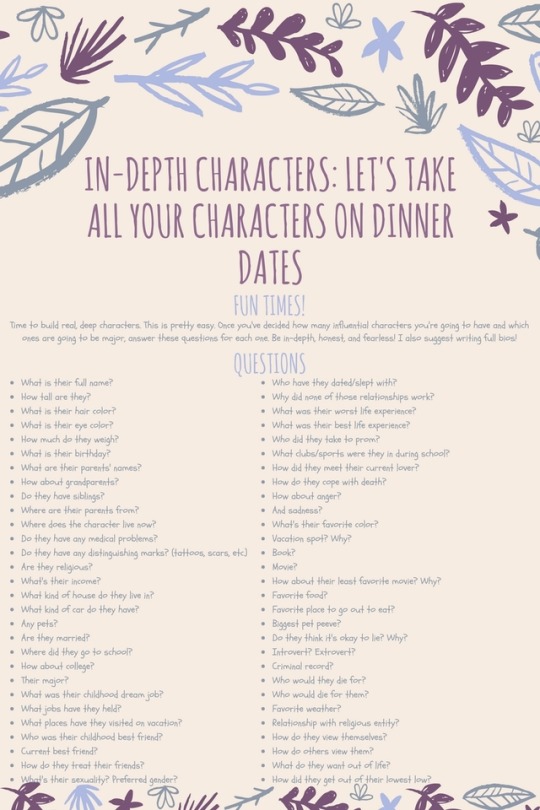
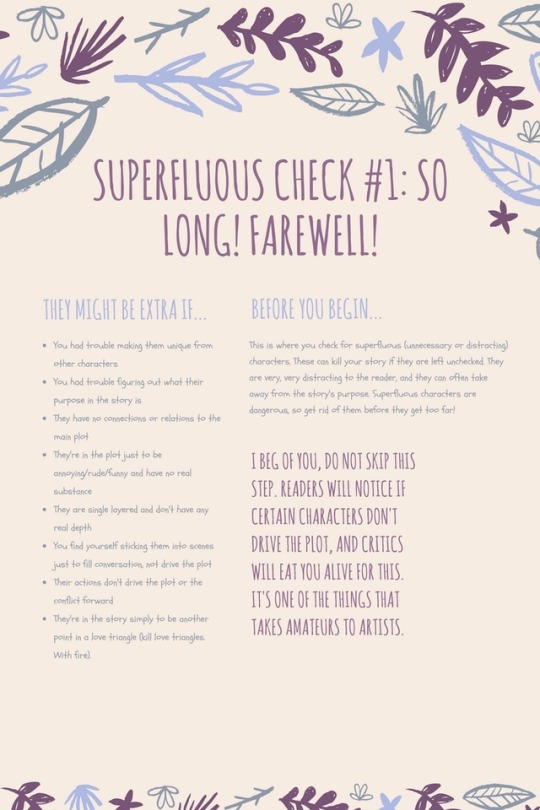
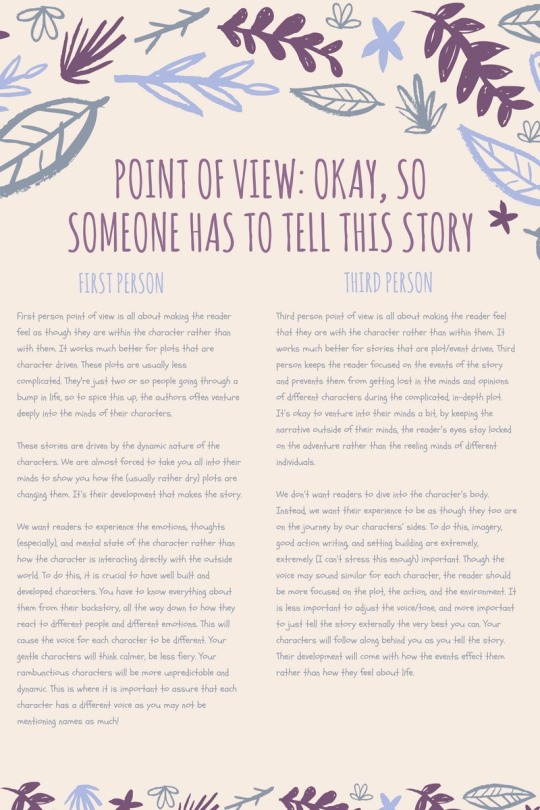
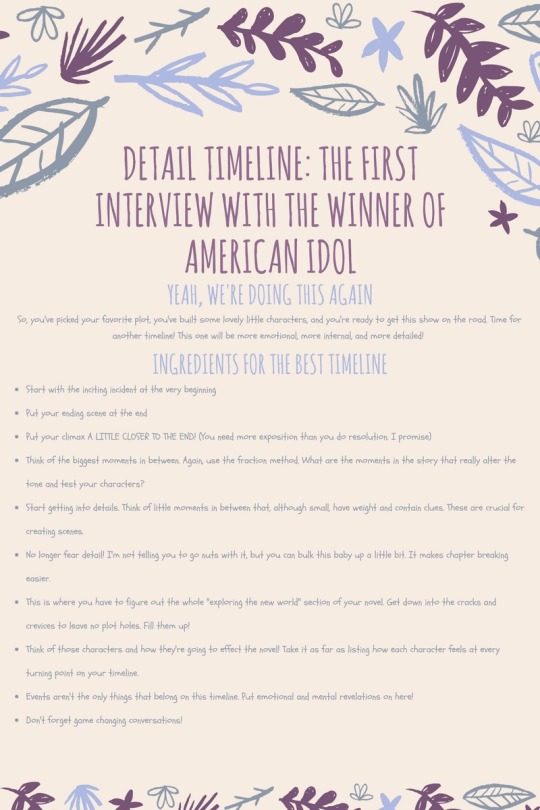
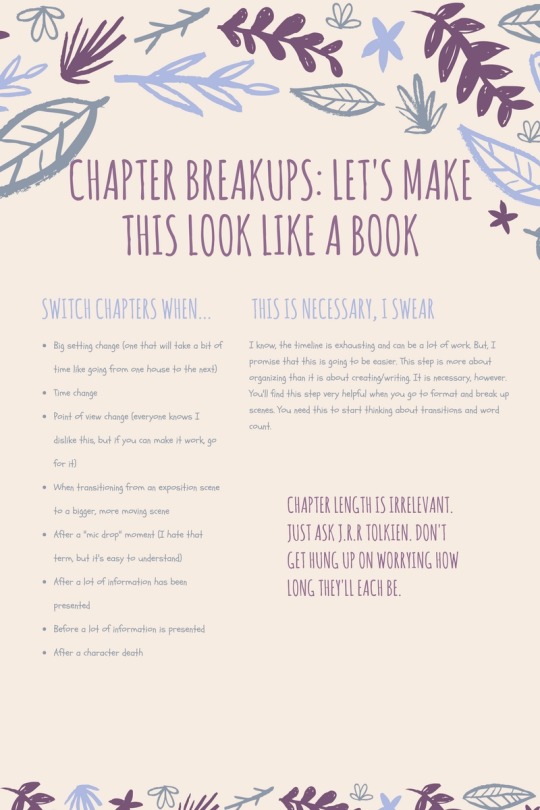
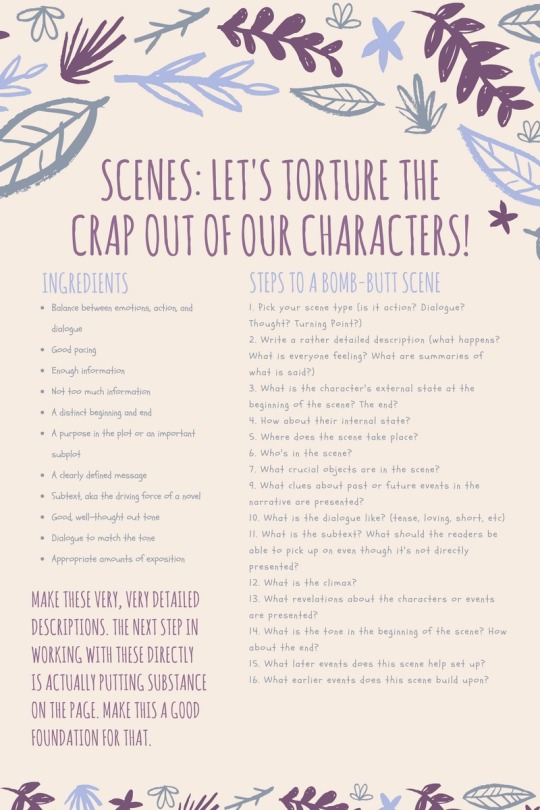
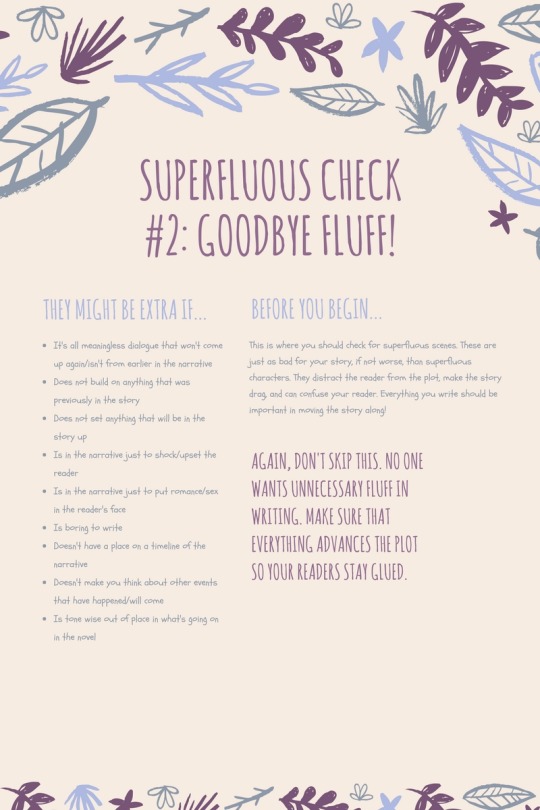
So, I heard that some of you were having issues with the download. Here’s my outlining guide just as is in photos. Same quality. Enjoy!
7K notes
·
View notes
Text
Fantasy Guide to Addressing Nobility
It can be hard to remember how to properly address your noble or royal characters when writing a fantasy court. Here is a quick guide:
1. King/Queen:
Usually addressed as either “Your Grace” or “Your Majesty”. Consort (married to a ruler and not reigning in their own right) can be addressed the same. Sire or Madam can be used also.

2. Prince/Princess:
They are addressed as “Your Highness”. They are NEVER addressed the same as a King or Queen
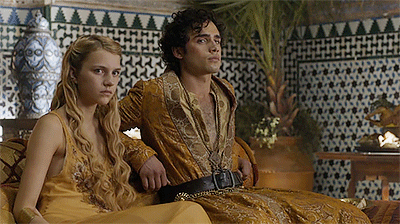
3. Duke/Duchess:
These are addressed with “Your Grace”. This was a common term also used by royalty before Henry VIII got to big for his codpiece.

4. Earl (Count)/Countess:
Are almost never referred as the “Earl of Narnia” but “Lord Narnia”.
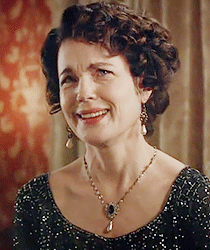
5. Lord/Lady:
An easy one. They are called “My Lord” or “My Lady”.

6. Emperor/Empress:
These may be equal to a King/Queen for status but the have a grander title. They are only addressed as “Your Imperial Highness/Majesty”
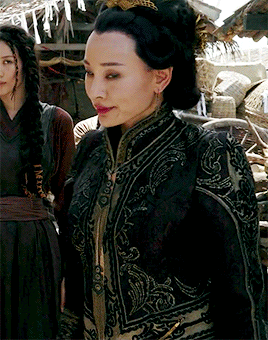
I hope this helps when writing your court or fantasy novel.
36K notes
·
View notes
Text
Some Things to Think About While Writing Your Fantasy Novel
Is there any way I can add a unique spin to dragons/fairies/unicorns/other mythos?
Is there a troupe or cliche I can subvert here?
Have I done my research? (Yes you need to do research when writing fantasy stories.)
Can I make this gayer?
Will this just come off as another “chosen one” story?
Is my main character enjoyable to be in the head of? (If you’re writing first person, that is.)
What tone am I going for? (funny, serious, inspiring, whimsical, depressing, more than one of the above?)
Am I avoiding negative stereotypes?
Can I make this gayer?
Does the magic system follow the rules I’ve established?
Have I established rules for my magic system?
Just how far are my characters travelling, and how long does it take?
What are the customs of this setting? (Social cues, common stories, dialect, beliefs?)
Can I make it even gayer?
Am I respectful to any cultures or ethnicities I draw inspiration from and/or am representing in my novel?
3K notes
·
View notes
Text
I feel like when you’re writing, organizing chapters and dialogue is easy
but jfc, the amount of time it takes to constantly keep people moving and make sure they’re in the right spaces and trying to come up with wording for it is always such a shock.
Like, fuck, I made you pick up a coffee cup, you need to put it down at some point. also I can’t remember what I dressed you in, can you push up your sleeves? I don’t remember if you even have your shirt on.
and YOU. YOU OVER THERE, you got out of your chair earlier, but did you come back yet? Are you coming back? Where did you even go and why’d you get up? Fuck, I can’t make you sit down again already, you just stood up, go…over there. go get more coffee. Did you bring your mug with you? fine. bring the pot to the table and—wait, wasn’t the coffee pot already over here? shit, hold on, I need to go back and re-read and re-write
165K notes
·
View notes
Text
The quickest show not tell tip ever.
‘Always show, not tell,’ is a big fat lie. If you always show, you’ll have half a novel of descriptive words and flowy sentences that will be hard to read.
Here is a quick tip:
Show emotion.
Tell feelings.
Don’t tell us ‘she was sad.’ Show us- ‘Her lip trembled, and her eyes burned as she tried to keep her tears at bay.’
Don’t show us ‘her eyelids were heavy- too heavy. Her limbs could barely function and she couldn’t stop yawning.’ Tell us - ‘she felt tired that morning.’
Showing emotion will bring the reader closer to the characters, to understand their reactions better. But I don’t need to read about how slow she was moving due to tiredness.
Likewise, when you do show, keep it to a max three sentences. Two paragraphs of ‘how she was sad,’ with no dialogue or inner thought is just as boring.
21K notes
·
View notes
Link
I know we’ve seen this discussion pop up more than once (like the author of this piece points out, it usually cycles through every few months) but this is probably one of my favorite set-downs of the Non-HEA crowd yet.
It’s well phrased, fairly comprehensive, and just slightly scathing.
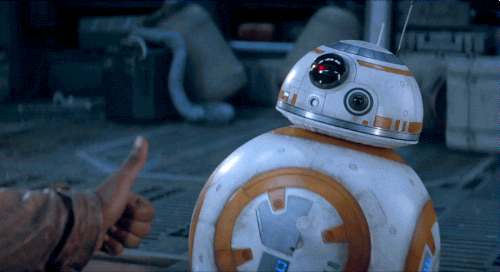
8K notes
·
View notes
Text
I literally only have one rule in my writing and it is this:
No matter what I put my characters through, they make it. They get to make it to the end of the story and have everything work out and be ok.
Because that’s the story I need. So it’s the kind I write.
91K notes
·
View notes
Note
if all humans were removed from a rural area, and then returned ~30 years later, what would the likelihood be of any populations of livestock (sheep/cows particularly) surviving that long unattended? and if they survived, would it be feasible for them to be retaken as farm animals immediately, or would there be difficulties in that regard? thank you! :)
Farm animals do sometimes escape and establish feral populations. Australia has plenty of them, owing to our lack of large carnivores, so we have plenty of examples.
The sheep are not going to do well if they’re any breed that requires sheering. The fleece just gets so big and heavy and keeps growing, that while a sheep might survive 5 years or so without human intervention, there is so much fleece that it’s not going to be able to breed. It’s a combination of mechanically doing the job, and testicular heating. Sheep also fare poorly with feral dogs.
Cattle do pretty well running feral in a stable environment. They’re big enough to get basically wherever they want to go, have a big rumen reserve of water and band together well. Their main difficulty in survival is that their gestation period is 9 months, which means a fecund cow can start having her calves earlier each year. In a good environment this might be fine, but in an environment with periodic hardships (drought, fires) calving at the wrong time of year can be severely detrimental for the calf, and potentially detrimental to the cow.
Contrast this with the feral donkeys of Australia’s top end, which foal every 11 months or so, which means they’re always giving birth at their best time of year, and they actually have an advantage in neonate survival.
Goats do excellently when permitted to run feral. Pigs do very well too, both species happy to indulge in their desire to taste test everything.
Modern chicken breeds I would not be overly optimistic about. Foxes are a thing and modern breeds are plump, heavy and not hardy. Heritage breeds might fare better.
After thirty years, those animals will have been adapting over multiple generations to better suit their environment. They’re likely to be hardier, but less efficient at turning food into muscle. They will have lost a significant amount of their habituation to humans but this could potentially be improved over a few generations. In the meantime they’re going to he flightier to handle, and less tolerant of human proximity.
Keep in mind that with livestock, a potential lack of be-testicled individuals may prevent survival of the species over the following decades. Some farms don’t keep entire males on them for husbandry reasons, or may only have one bull/ram/boar, and if something happens to him then unless the resident females are pregnant and have sons, that’s the end of that population.
572 notes
·
View notes
Photo
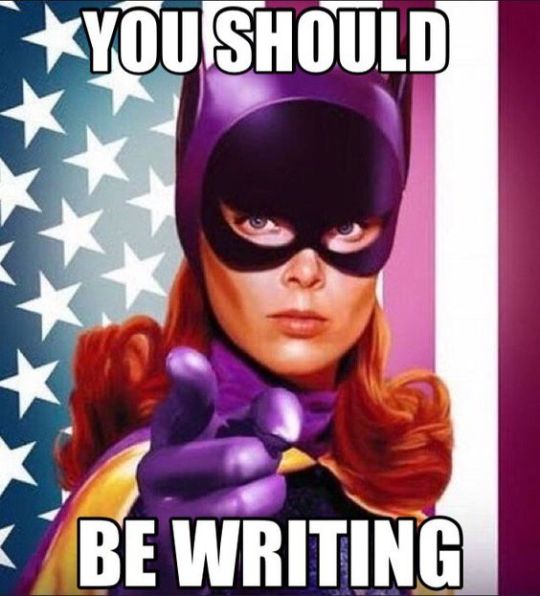
You Should Be Writing
Source for comic: @AcademicBatgirl
116 notes
·
View notes
Photo




You guys, you must stop doing this. You must. We cannot keep yelling at you about it because it makes us so angry, and we are already angry all the time, about real things, like how our lives are turning into a real world Handmaid’s Tale, ha ha ha ha ha ha ha haha ha ha ha ha ha. We cannot keep spending our energy being mad at mediocre men for writing mediocre books that inexplicably win awards and that people tell us to read, for some fucking godawful who knows reason.
So men. My guys. My dudes. My bros. My writers. I am begging you to help me here. When you have this man in your workshop, you must turn to him. You must take his clammy hands in yours. You must look deep into his eyes, his man eyes, with your man eyes, and you must say to him, “Peter, I am a man, and you are a man, so let us talk to each other like men. Peter, look at the way you have written about the only four women in this book.” And Peter will say, trying to free his hands, “What? These are sexy, dynamic, interesting women.” And you must grip his hands even tighter and you must say to him, “ARE THEY, PETER? Why are they interesting? What are their hobbies? What are their private habits? What are their strange dreams? What choices are they making, Peter? They are not making choices. They are not interesting. What they are is sexy, and you have those things confused, and not in the good way where someone’s interestingness makes them become sexy, like Steve Buscemi or Pauline Viardot. Why must women be sexy to be interesting to you? The women you don’t find sexy are where, Peter? They are invisible? They are all dead?” He is trying to escape! Tighten your grasp. “Peter, look at this. I mean, where to begin. ‘She could have been any age between eighteen and thirty-five?’ There are no other ages, I guess? Do you know what eighteen-year-olds really look like, in life? Do you know what thirty-SEVEN-year-olds look like, god forbid? And not that this is even the point, but why are these supposedly sexy and dynamic and interesting women BOTHERING with your boring garbage ‘on the skinny side of average’ protagonist? Why did you write it like this, Peter?”
And maybe Peter will say at last, “I don’t know.” Maybe he will be silent for a long long long time, and then maybe he will say, “I guess it’s scary and difficult for me to imagine the interiority of women because then i would have to know that my mother had an interiority of her own: private, petty, sexually unstimulating, strange: unrelated to me and undevoted to my needs. That sometimes I was nothing to my mother, just as sometimes she is nothing to me. That I was not at all times her immediate concern.”
“I know, Peter,” you can tell him gently.
“I don’t want to know that my mother was a human being with an internal life, because to know that would be to risk a frightening intimacy with her,” Peter will say, maybe. “Because to know that would be to know that she was only a small, complicated person, no bigger or smaller than I am, and I am so small. To know how alone she was. How alone I am. How alone we all are. That my mother survived with no resources more mysterious than my own. And yet she gave me life. My God: she gave me life. How can I pay her back for that? And how can I forgive her for it? How can I ever repay her for the good and the evil of it, my life, every day of my life?” He will be sobbing probably. “I am frightened of her. I am frightened of loneliness. I am frightened of dying. O God. My God. I didn’t know. I didn’t know.” Drool will run from his mouth as he cries. The way babies cry. He will be ashamed. You must hold him. You must say, “Shh, Peter. Shh.” Wrap your man arms around him. Hum into his thin hair as your own mother hummed once into your own sweet-smelling baby scalp. Kiss him gently on his mouth. There. You did it, men. You fixed sexism. Thank you. You’re the real hero here, as always, you men, and your special man powers, for making art.
80K notes
·
View notes
Text
When Your Number Is Called
My name is Courtney, and I was born at 5:15 AM on October 26th, 1988. When I was born my parents didn’t ask the doctor if I was a boy or a girl, or if I was healthy. Instead they asked, “what’s the number?”
The room braced for the doctor’s answer. My parents held each other close, both openly crying as they prayed for good news. “Her number is…” started the doctor, flipping my right wrist over and reading the black numbers that spread across it. “152310232048.”
My parents cried in relief.
I would live a good life.
I had a good number.
You see, in my world, everyone is born with a 12-digit number on their right wrist. What does the number mean exactly? Well—the number gives us the day we die. We don’t know how we will die, but we will—at that exact time. Think of it like the expiration date you see on a jug of milk. After the expiration date, you throw away the milk, right? Well, that is what the marks on our wrists mean. We obviously don’t get thrown away in the trash, but we cease to exist after that date. And just like that jug of milk buried in some landfill, we too will be buried in the ground.
My number is 152310232048.
Which means that at 3:23 PM on October 23rd, 2048—I will die.
I will live to be 59 years old.
I have a good number. It isn’t the best number. My brother is going to live to be 88. My parents, couldn’t believe it when the doctor read his number out loud. He will live 29 years longer than me. He will see so much more than me, experience so much more than me. He might even live to see his great-great grandchildren—I’ll be lucky to see my grandchildren.
I sometimes get jealous when I see his number.
But this is my life.
I can’t change my number.
It is permanent.
Medicine, money, and miracles do not change your number. You can certainly die earlier then your number, but to die before your number is rare. People just tend to be more careful. After all, when you are constantly walking around with a literal reminder of your time left on earth on your wrist, you tend appreciate the life you have a little more.
I have a good number.
I’m reminded of this when I see other people’s number.
The first time this happened was when I was 5 years old.
On my first day of school, I was in kindergarten and I’ve never really interacted with any other kids besides my older cousins. I was nervous, so when recess was called, I decided to go to the swings. Anyone who liked swings as much as me—well, they were cool in my book.
On my way to an open swing a wild boy with a dinosaur shirt, and brown eyes full of mischief, performed a back flip off the swings and nearly knocked me over in his crash landing. He jumped up, dusted off his pants and smiled at me and said, “My names Devon, and I am going to live to be 57.”
It was such a typical kid way of introducing themselves. Adults tended to be more secretive of their numbers. Wearing watches, or long-sleeved shirts to cover up their numbers, but five year olds—we didn’t understand the concept of subtlety.
Clearly.
Another body quickly landed next to him, this one thankfully on their feet. It was a red-haired girl, with two perfectly braided pig tails. “My names Fiona, and I’m going to live to be 62.”
Another body landed next to her. He stumbled a bit on his landing, and his glasses fell down the bridge of his nose as he found his balance. “Hi, I’m Oscar,” he smiled, shaking his long brown hair out of his eyes as he pushed his glasses up his nose. “I’m going to live to be 17.”
Mind you—we were in kindergarten. We were literally learning our ABC’s, learning how to tie our shoes, and zip up our coats, but the concept of numbers—that we didn’t need to learn. Our parents made sure we knew what our number was, and what their number was, and what grandma’s number was—numbers were literally ingrained into our minds, much like the literal numbers that adorned our wrists.
Which meant even at 5 years old, I knew that Oscar—well Oscar, had a bad number.
It must have showed on my face because the boy—a boy who I didn’t even know, hugged me. And as he squeezed me, he said, “It’s okay,” before pulling back and smiling. “My dad’s say that seventeen is plenty of time. They said it is isn’t about how high your number is—but it’s about what you do with the number you get.”
Looking back now, as an adult thinking about having my own child—I’d probably say the same thing to my child if they were born with a bad number. What else can you do? You can’t change your child’s number. You can’t give your child more time, no matter how much you wish you could take the numbers off your wrist and place them on your child’s—you just can’t. Your job as a parent is to protect your children, but you can’t protect them from the inevitable, so instead, you give them something else.
Oscar’s dads gave him hope.
His dads were great people. I grew close to them as we progressed through school because obviously, Oscar, Fiona and Devon and me—we became best friends after the day on the swings. We called our group “The Swingers,” much to the embarrassment of our parents. We didn’t understand why they didn’t like our group nickname when we were young, but we finally understood when we were 15—and thanks to the internet, we learned exactly what “swingers” were. But even after learning the sexual nature of our group nickname, we still kept it, because honestly, what teenagers didn’t like tormenting their parents?
“Courtney where are you going? It’s late!”
“Dad said I can go to Oscar’s house!”
“And what will you be doing at Oscar’s house?”
“God mom—we are just having a swinger party, can I go now?”
The look of embarrassment on my parent’s face was always perfect—especially in public.
Speaking of Oscar’s house. His house became the “hang out” spot for us four. Mostly because his dads had an awesome basement, and his dad Jerry was professional Chef, which meant we ate good there. But back to Oscar’s dads—they were awesome. They adopted Oscar when he was just an infant. His mother gave him up when she saw his number. It was an epidemic in our world. Foster homes were full of children with bad numbers.
But Oscar’s dads, they didn’t see his number. They just saw Oscar. This happy, intelligent, beautiful blue-eyed child who just so happened to be destined to die young. They didn’t see his number—instead they just saw Oscar.
Devon, Fiona, and I—we only saw Oscar too.
Most of the kids in our class didn’t really attempt to get to know Oscar, because honestly, what was the point? He wouldn’t be around for long. So, it was the four of us—for as long as we had the four of us.
We laughed.
We cried.
We fought.
We experienced our first kisses.
We loved.
We had our hearts broken.
We got drunk once—never again.
We got high—more than once.
We just lived.
“The Swingers” lived every day to the fullest—until the day came when four was about to become three. Oscar’s day would land just a few weeks before our Senior graduation. We always knew his number, but it never seemed real until it came so close to the actual date on our calendar.
Oscar took accelerated courses so that he could graduate before—his number came up. The school planned a graduation ceremony just for him the day before his number. His dad’s and his extended family fills the stands, the rest of his class sit in the chairs, the very same chairs they will soon fill in a couple of weeks when the class of 2007 would all walk together. The principal called out Oscar’s name, and he stepped up to the microphone.
Oscar was the schools valedictorian. He stayed late after school, he studied well into the night, he worked hard—so hard, that his dedication to his studies really got in the way of “swinger” time. One day, after another late night of not seeing Oscar because he was studying for a Chemistry test, I yelled at him. “It is just a Chemistry test Oscar! If you get a B, it won’t be the end of the world!”
Oscar barely blinked an eye at my outburst, instead, much like that day in front of the swings—he pulled me into a hug. “Look, this is the only time I have to be great,” he said. “I don’t get anything after this. So, if this is all I get—I’m going to be the best.”
And he did.
He became the best.
A 4.0 grade point average
An SAT score of 1560.
And he never filled out a single college application.
Oscar cleared his throat in front of the microphone, garnering everyone’s attention. “Thank you for everyone who came today. It means a lot, to me. Very much like my life, I’m going to keep this speech short.”
Gasps echoed through the gym and Oscar smiled.
“That was not meant to be a joke. Please don’t think that I am making light of the fact that tomorrow is my number. Instead, I say that I will keep this speech short—because I think the world tends to greatly underestimate the power of something short.”
“My mother gave me up for adoption when I was only 1 minute old. As soon as the doctor read my number, she signed over custody of me to the state. I always wondered, how can I be judged of my quality of life, before I’ve even taken my first shit.”
Laughter echoed from the students, gasps echoed from the parents, and grumbles of disapproval echoed from the teacher’s and administration. But Oscar just smiled, as he looked back at the principal. “Feel free to give me a detention this weekend for cussing,” he joked, earning another chuckle from the students.
“She was wrong—by the way,” continued Oscar, his gaze going back out to the gym. “Anyone who ever stared at my number, and looked at me with sadness—you were wrong. I have lived—not as long as our parents and not as long as you all will live—but make no mistake, I have lived. My life may have been short, but it doesn’t mean it has been any less significant as someone who lived well into their 80’s.”
Taking in a breath, he gave his parents and then the swingers a shaky smile. “Every second of every single day for the past seventeen years—have been lived to the fullest because simply, I didn’t have the time to waste. Every moment of my life has counted, cherished and loved—can you say the same thing about yours?”
Oscar died on 2:13 PM on March 16th, 2007.
Like his number said, he lived to be 17.
He had a bad number
But he didn’t let his number define him.
Instead he lived every day, until his number was called.
This story was adapted and turned into a 50 page short story, and is now available for purchase through Amazon!
The Kindle format can be purchased here for $2.99
The Paperback format can be purchased here for $5.99
It is also free with Kindle Unlimited!
Thank you for reading this story, and for your support if your purchased the book!
44K notes
·
View notes
